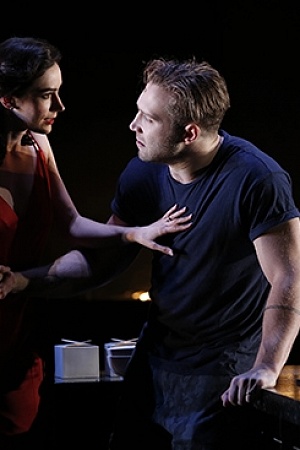Othello (Bell Shakespeare) ★★★★
Whatever else Peter Evans's production of Othello has going for it, and it has indeed much, the speaking of Shakespeare's verse is outstanding. It is never declamatory, in the way that some famous actors of earlier decades dealt with it. The verse emerges entirely intact, but is always made to sound at the same time conversational, as if the thoughts it articulates, whether in dialogue or soliloquy, rhyme, or blank verse, have just now given rise to it. The effect of this is to create before our eyes – and ears – characters so intensely real that sometimes, though we know the outcome, we wonder if all will happen that way. Surely, we think, no one will believe Iago; surely Othello will stop short of his murderous intent. In other words, there is such a persuasive accommodation between the glories of the Shakespearean pentameters and the personal motivations, whether subtly vicious or guilelessly innocent, that the interior action of the play utterly engrosses.
This Othello is set in the present day: the fact that the younger men are wearing those fashionable stove-pipe trousers indicates the contemporary scene: but there is no sense of gimmickry about this, and no sense of the verse's being disconcertingly at odds with this, as has sometimes been the case with Shakespearean productions desperately determined not to be constrained by doublet and hose. The mix of T-shirts and military uniforms, for instance, never seems inconsistent.
Continue reading for only $10 per month. Subscribe and gain full access to Australian Book Review. Already a subscriber? Sign in. If you need assistance, feel free to contact us.














Leave a comment
If you are an ABR subscriber, you will need to sign in to post a comment.
If you have forgotten your sign in details, or if you receive an error message when trying to submit your comment, please email your comment (and the name of the article to which it relates) to ABR Comments. We will review your comment and, subject to approval, we will post it under your name.
Please note that all comments must be approved by ABR and comply with our Terms & Conditions.